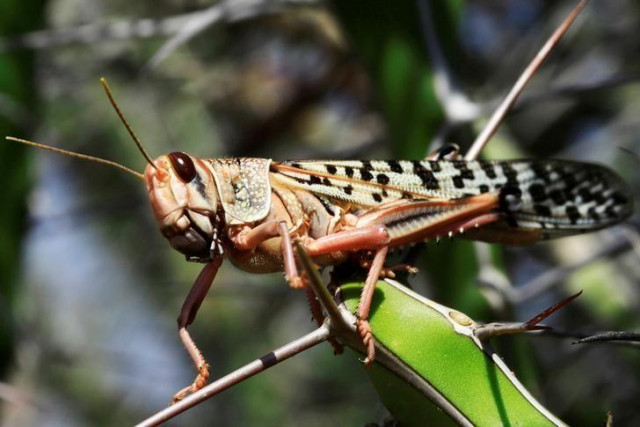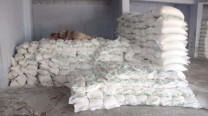37% area of Pakistan vulnerable to locust attack
Punjab govt tells SC says Sindh, Balochistan and K-P provinces face immediate threat of pest attack

PHOTO: REUTERS/FILE
“If the desert locust is not contained, Punjab and Sindh may become summer breeding zone of the pest," said a report submitted to the Supreme Court by Punjab government through Additional Advocate General Chaudhry Faisal Hussain.
It said desert locust appeared in Punjab’s Cholistan area in July last year. In November last year, locust swarms started migration toward Balochistan and South Punjab.
“So far crops over an area of 715 acres in Punjab have been damaged,” it said.
According to the report, the federal government is responsible to control desert locust but the province of Punjab has managed to contain locust despite limited resources. “However, Sindh, Balochistan and Khyber Pakhtunkhwa (K-P) provinces face immediate threat of a locust attack,” it added.
The report also highlighted vulnerability along borders with Iran and India and unavailability of correct resources like micron spray machines.
It said Punjab’s Bahawalpur district will be a major battlefield in the summer and swarms will be coming from Sindh and Indian Rajasthan due to wind storm before December.
“There is an immediate need for deployment of maximum resources in summer breeding area. Punjab has 15 percent area falling mainly in Cholistan but now vulnerability has extended to the central and North Punjab due to climate change and massive egg-laying. “
It said Punjab has arranged helicopters for spraying in South Punjab region but the same method should be employed in the other provinces.
According to the report, 50 micron sprayers, 5 airplanes and 50 entomologists are urgently required to support surveillance and combat operations in Punjab.
An apex court bench will resume hearing of case on Monday
Army chief General Qamar Javed Bajwa on Thursday also reiterated that the army would make all possible resources available to help the civil administration combat the threat posed by locust attack.
“Effective control operations are essential for ensuring food security in the country and in mitigating the negative economic impact [of pest plague],” the army chief said during a visit to the National Locust Control Center (NLCC) in Rawalpindi
According to a statement issued by the Inter-Services Public Relations (ISPR), NLCC Chief Coordinator Lt Gen Moazzam Ejaz briefed the army chief about the efforts undertaken to counter the threat. General Qamar appreciated the NLCC role in synergizing national efforts in line with the National Action Plan.
The government has already declared a national emergency in this regard as hopper bands of the Schistocerca gregaria – commonly known as the desert locust – have already devoured large quantities of crops in over 60 districts of all the provinces.
These insects, mainly originating from deserts, eat anything from bark to seeds and flowers while travelling up to a speed of 149km a day.
The region saw first wave of locust invasion in May last year since 1993. According to the UN Food and Agriculture Organisation (FAO), Pakistan’s 38% of agricultural fields are breeding grounds for the insects.
On Friday, Punjab Chief Minister Usman Buzdar also took an aerial view of Rahim Yar Khan, Rojhan, Bhong, Sadiqabad, Kot Sabzal and other areas to review the damage to crops caused by locust attack.
The chief minister issued necessary directives to the Provincial Disaster Management Authority (PDMA) director general (DG) to avert further damage during the helicopter surveillance of the destroyed fields.
Buzdar ordered the authorities concerned to take every possible step to counter locusts that are wreaking havoc all over the province. “Saving crops from locusts is the top priority of the government as it threatens food security of the country,” he said.



















COMMENTS
Comments are moderated and generally will be posted if they are on-topic and not abusive.
For more information, please see our Comments FAQ